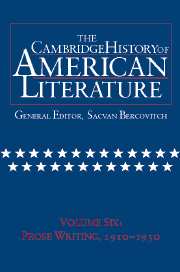Book contents
- Frontmatter
- Introduction
- A Cultural History of the Modern American Novel: Introduction
- 1 A Dream City, Lyric Years, and a Great War
- 2 Fiction in a Tme of Plenty
- 3 The Fate of Writing During the Great Depression
- Fictions of the Harlem Renaissance
- Ethnic Modernism
- Introduction
- 1 Gertrude Stein and “Negro Sunshine”
- 2 Ethnic Lives and “Lifelets”
- 3 Ethnic Themes, Modern Themes
- 4 Mary Antin: Progressive Optimism against The Odds
- 5 Who is “American”?
- 6 American Languages
- 7 “All the Past We Leave Behind”? Ole E. Rölvaag and the Immigrant Trilogy
- 8 Modernism, Ethnic Labeling, and The Quest for Wholeness: Jean Toomer’s New American Race
- 9 Freud, Marx, Hard-Boiled
- 10 Hemingway Spoken Here
- 11 Henry Roth: Ethnicity, Modernity, and Modernism
- 12 The Clock, The Salesman, and the Breast
- 13 Was Modernism Antitotalitarian?
- 14 Facing the Extreme
- 15 Grand Central Terminal
- Chronology
- Bibliography
- Index
14 - Facing the Extreme
from Ethnic Modernism
Published online by Cambridge University Press: 28 March 2008
- Frontmatter
- Introduction
- A Cultural History of the Modern American Novel: Introduction
- 1 A Dream City, Lyric Years, and a Great War
- 2 Fiction in a Tme of Plenty
- 3 The Fate of Writing During the Great Depression
- Fictions of the Harlem Renaissance
- Ethnic Modernism
- Introduction
- 1 Gertrude Stein and “Negro Sunshine”
- 2 Ethnic Lives and “Lifelets”
- 3 Ethnic Themes, Modern Themes
- 4 Mary Antin: Progressive Optimism against The Odds
- 5 Who is “American”?
- 6 American Languages
- 7 “All the Past We Leave Behind”? Ole E. Rölvaag and the Immigrant Trilogy
- 8 Modernism, Ethnic Labeling, and The Quest for Wholeness: Jean Toomer’s New American Race
- 9 Freud, Marx, Hard-Boiled
- 10 Hemingway Spoken Here
- 11 Henry Roth: Ethnicity, Modernity, and Modernism
- 12 The Clock, The Salesman, and the Breast
- 13 Was Modernism Antitotalitarian?
- 14 Facing the Extreme
- 15 Grand Central Terminal
- Chronology
- Bibliography
- Index
Summary
The film director Joseph Losey once commented on the disillusioning quality of the 1940s and early 1950s: “After Hiroshima, after the death of Roosevelt, after the investigation, only then did one begin to understand the complete unreality of the American dream.” How did American writers fictionalize some of the extreme experiences of the 1940s – among them, the Holocaust of the European Jews and the nuclear destruction of the cities of Hiroshima and Nagasaki? How did ethnic writers react at a time when countless people were arrested, tortured, or killed, not for what they had done but for who they were, and when civilians were killed simply for where they were? Were modernist strategies helpful in representing the world of modernity that World War II had so brutally redefined?
World War II seemed to have made true and even surpassed the most nightmarish fears of modernity. The Lithuanian of The Life Stories described tourism of fine ladies to Chicago’s industrial slaughterhouses. Antin gave an account of a disinfection at the German border. Mike Gold experienced a subway trip as a cattle-car ride. Saroyan imagined death as the subject of advertising slogans. Roth had a vision that drew on one of the highest sources of energy he could imagine. Now, means of transportation like planes and trains had become means of killing. “Streetcars,” in soldier slang going back to World War I, meant “heavy long-range shells.”
- Type
- Chapter
- Information
- The Cambridge History of American Literature , pp. 539 - 551Publisher: Cambridge University PressPrint publication year: 2002



